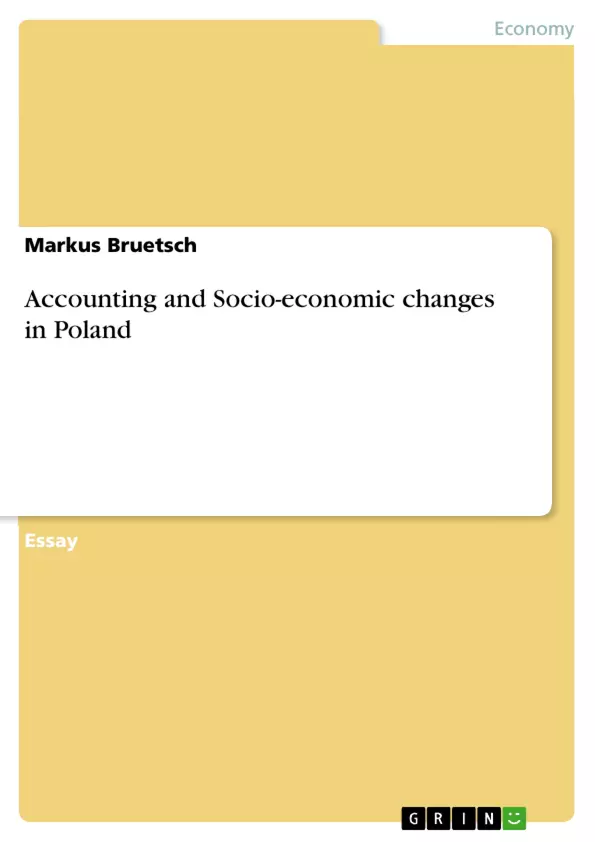“Accounting is not a science: It has been developed to serve a purpose”. A statement
that might be controversially discussed nowadays since the collapse of the socialism,
growing globalisation and the convergence of international financial markets have
forced national accounting systems to change during the last decades. This paper
will examine the validity of this statement in particular on the example of the recent
development in Poland. First it will briefly introduce the social and economic
environment in Poland under socialism, its transition to a market economy and the
current situation and future prospects. Second, the economic and social development
of Poland will be related to changes in the polish system of accounting and financial
reporting. A short view on the development of the accounting profession will be
given. Finally, a conclusion will compare the given statement with the polish situation
and give proof for its validity. After World War II Poland introduced a planned economy urged by the Russian
paradigm. Private property was restricted to agriculture, manufacturing and few
business services. In the late 70th Poland went into serious economic struggles
emerging from a high level of public debt from reinforcing the industrial sector.
Poland had to face sustainable inflation problems which finally lead to the breakdown
of the communistic regime (Roberts et al, 1998b). It was replaced by a coalition
government under leadership of the trade union movement „Solidarnosc“ in 1989. [...]
Inhaltsverzeichnis (Table of Contents)
- Introduction
- The economic situation in Poland
- Poland under socialism
- Poland in transition
- The current situation and future prospects
- The change in accounting
- Accounting under socialism
- Accounting in transition
- The new accounting and future development
- The Auditing Profession
- Conclusion
Zielsetzung und Themenschwerpunkte (Objectives and Key Themes)
This paper examines the development of accounting in Poland, particularly in relation to the country's transition from a socialist to a market economy. It seeks to analyze the validity of the statement, "Accounting is not a science: It has been developed to serve a purpose," in the context of Poland's economic and social changes. The paper connects Poland's economic situation under socialism, its transition to a market economy, and its current state with the evolution of accounting practices. The paper explores the accounting profession in Poland and concludes by evaluating the validity of the statement in light of the Polish context.
- The impact of economic and social changes on accounting practices
- The evolution of accounting systems in Poland from socialism to a market economy
- The role of accounting in economic recovery and growth
- The impact of globalization and international financial markets on accounting practices
- The development of the accounting profession in Poland
Zusammenfassung der Kapitel (Chapter Summaries)
The introduction lays out the context of the paper, emphasizing the shift in global accounting practices driven by globalization and market reforms. The paper focuses on Poland as a case study for understanding these changes, highlighting the economic and social circumstances that led to the transformation of its accounting system.
The second chapter analyzes the economic situation in Poland, starting with its socialist era and moving into its transition to a market economy. This section provides a background for understanding the subsequent changes in accounting practices, examining factors such as inflation, unemployment, and the introduction of a convertible currency. The chapter concludes with a look at the current economic situation and future prospects for Poland.
The third chapter delves into the changes in accounting practices, highlighting the shift from a centrally controlled system under socialism to a more market-oriented approach. It examines the features of accounting under socialism, focusing on the limitations and challenges of the system. The chapter then explores the transition period and the new accounting practices adopted in line with market principles.
The fourth chapter provides an overview of the auditing profession in Poland, exploring its role in ensuring financial transparency and accountability.
Schlüsselwörter (Keywords)
The primary focus of this work is on the evolution of accounting systems and the impact of economic and social changes on financial reporting in Poland. The paper explores key concepts such as the transition from socialism to a market economy, the role of accounting in economic recovery, the development of the auditing profession, and the impact of international accounting standards.
Frequently Asked Questions
Is accounting considered a science in the Polish context?
The paper discusses the view that accounting is not a science but a tool developed to serve specific socio-economic purposes, which changed as Poland transitioned from socialism.
How did Polish accounting differ under socialism?
Under socialism, accounting was part of a centrally planned economy focused on meeting state requirements rather than market-driven financial reporting.
What was the impact of the "Solidarnosc" movement on the economy?
The movement led to the breakdown of the communist regime in 1989, paving the way for market reforms and a new system of financial reporting.
What role does auditing play in modern Poland?
The auditing profession ensures financial transparency and accountability, which is crucial for Poland's integration into global financial markets.
How did globalization influence Polish accounting?
Growing globalization forced Poland to align its national accounting system with international standards to attract investment and participate in global markets.
- Quote paper
- Markus Bruetsch (Author), 2003, Accounting and Socio-economic changes in Poland, Munich, GRIN Verlag, https://www.grin.com/document/14845



